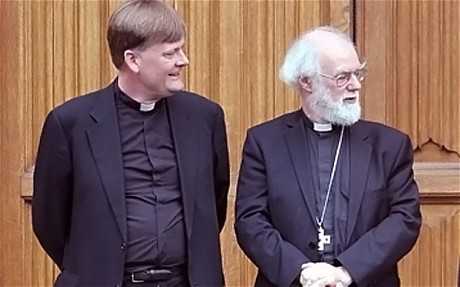The Archbishop of Canterbury is at the centre of a row after it emerged he had appointed a Freemason to be a bishop.

By Jonathan Wynne-Jones, Religious Affairs Correspondent
Dr Rowan Williams named the Rev Jonathan Baker as the next Bishop of Ebbsfleet despite knowing he was an active and senior mason.
The appointment, announced earlier this month, marked a significant U-turn by Dr Williams who had previously said that Freemasonry was “incompatible” with Christianity and had refused to promote Masons to senior posts.
Last week, as news of Fr Baker’s membership of the Masons began to circulate through the Church, it provoked growing concern and criticism from clergy and members of the General Synod.
When contacted by The Sunday Telegraph on Friday, Fr Baker defended his continued membership of the Masons and insisted it was compatible with his new role as a bishop.
Yet yesterday he said he had changed his mind was leaving the masons so he could concentrate on being a bishop, adding: “I wish nothing to distract from the inauguration of that ministry.”
Freemasonry, a secretive male-only organisation dating back 300 years, requires its members to declare a belief in a “supreme being” and to undergo elaborate rituals.
Fr Baker joined the Apollo University masonic lodge in Oxford while he was a student, in an initiation ceremony that involves promising to keep the “secrets of Freemasonry”.
This ritual is said to involve members being blindfolded, wearing a hangman’s noose, and being warned that those who break the oaths of allegiance will have their throat slit and their tongue torn out before being buried in the sand.
He remained a member of the lodge for more than 20 years until his resignation yesterday, rising in the organisation to serve a term as an assistant Grand Chaplain.
Fr Baker, who is currently principal at Pusey House in Oxford, said he had told Archbishop Williams he was a mason when they discussed his appointment to be the next Bishop of Ebbsfleet – one of the “flying bishops” who oversee clergy opposed to women priests. The post had fallen vacant when its previous holder quit to join the Roman Catholic Church.
He said on Friday: “For many years I have been an active member and I continue to be a member. This came up in discussion with Rowan, but it has not caused a problem for me at any stage of my ministry and it won’t cause a problem now.”
He argued that it would not interfere with his role of overseeing traditionalist parishes and said he saw no conflict in being a bishop and a Freemason.
“I’ve never found it to be anything other than an organisation that is wholly supportive of the Church.”
However, yesterday he said: “I have concluded that, because of the particular charism of episcopal ministry and the burden that ministry bears, I am resigning my membership of Freemasonry.”
He said that in his conversation with Dr Williams about taking up the Ebbsfleet post, the Archbishop had asked him to reconsider his membership of Freemasonry, but was happy for the appointment to go forward while he was still a Mason.
Yet Dr Williams has previously expressed serious concerns about clergy being involved with the organisation.
In 2002, shortly before he became the Archbishop of Canterbury, Dr Williams wrote in a letter to Hugh Sinclair, of the Movement for the Register of Freemasons: “I have real misgivings about the compatibility of Masonry and Christian profession … I have resisted the appointment of known Masons to certain senior posts.”
A year later he repeated this unease when he tried to apologise for upsetting Freemasons with his comments, saying: “Where anxieties exist they are in relation not to Freemasonry but to Christian ministers subscribing to what could be and often is understood [or misunderstood] as a private system of profession and initiation, involving the taking of oaths of loyalty.”
His senior advisers went even further at the time. “He questions whether it’s appropriate for Christian ministers to belong to secret organisations,” said The Rev Gregory Cameron, a close friend and former chaplain to Dr Williams. “He also has some anxiety about the spiritual content of Masonry.”
A spokesman for Dr Williams said at the time that he was “worried about the ritual elements in Freemasonry, which some have seen as possibly Satanically inspired and how that sits uneasily with Christian belief”.
He continued: “The other idea is that because they are a society, there could be a network that involves mutual back-scratching, which is something he would be greatly opposed to.”
Last night, Christina Rees, a member of the Archbishops’ Council, said: “The fact that Jonathan Baker has resigned as a Freemason suggests to me there is a serious incompatibility between the organisation and the Church. If it was only a matter of perception, surely he could have stuck it out.”
Her comments were echoed by Alison Ruoff, a prominent member on the General Synod, who said she had been stunned to learn of Fr Baker’s involvement with the Masons.
“I’m pleased to hear he’s resigned as a Mason because it is clear that the gospel does not go with masonic beliefs,” she said.
“I think Rowan should have said he could not be a bishop if he continued to be a Mason.”
The Rev David Phillips, general secretary of the Church Society, a conservative evangelical group, said: “The Church has said that Freemasonry is not compatible with Christianity so appointing him as a bishop seems to contradict its own stance.”
Lambeth Palace declined to comment.
www.telegraph.co.uk, 14 May 2011